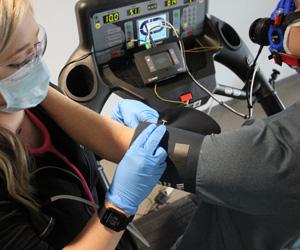|
|
|
|
|
|
 | S
|
Particulates in Precipitation
From radioactive rain to hitchhiking tardigrades, particulates in precipitation have big implications for ecosystems, according to ecosystem geographer Alexandra Ponette-González. A single raindrop can reveal a diverse community of organisms and non-living materials, which are potentially beneficial or harmful to ecosystems. Along with collaborators at Georgia Southern University and the Cary Institute of Ecosystem Studies, Ponette-González shines a magnifying glass on the microscopic materials that land on and flow through plants with water in a paper published in Frontiers in Ecology and the Environment. Their work highlights the potentially big roles these tiny particulates could play in ecosystems, with ripple effects through the environment and society from economic impacts on agricultural crop yields to environmental effects of pollutants.
|
|
|
|
|
|
|
|
 Examining How Cloth Masks Affect Exercise Examining How Cloth Masks Affect Exercise
A joint study between UNT and Baylor Scott & White Sports Therapy & Research at The Star in Frisco shows that exercising while wearing a cloth mask may lead to heavier breathing and faster fatigue. Kinesiology, health promotion and recreation researchers Jakob Vingren, chair, and David Hill, Regents Professor, helped to design the research and analyzed and interpreted the data. The study, which shows that participants wearing a cloth mask during exercise experienced a reduction in performance as intensity levels increased, compared to when not wearing a mask, was published in the British Journal of Sports Medicine. (Photo courtesy of Baylor Scott & White Health)
|
|
|
|
|
|
| Furthering Understanding of Plant Molecules |
Richard Dixon, associate director of UNT's BioDiscovery Institute, has helped researchers across the globe have a better understanding how to make condensed tannins in forage crops such as alfalfa, not only making food more nutritious for animals, but potentially improving food supply and limiting global warming. Tannins are biomolecules that bind to proteins in the human and animal diet. This binding slows the rate of protein degradation in ruminant animals like cattle, sheep and goats, resulting in reduced methane emissions. Tannins are abundant in coffee, tea and wine, where they affect flavor and provide human health benefits, giving the research far-reaching applications.
|
|
|
|
|
|
|
| College of Music Alumna Receives Fulbright Award |
|
College of Music alumna Bree Nichols will be working this fall to make Czech music more accessible to English-speaking singers and the community. Nichols received a Fulbright Research Award to travel to the Czech Republic, where she will focus on compiling the first anthology of Czech art songs. These classical songs set to poetry are usually written for solo voice and piano and are traditionally performed in more intimate performance spaces such as recital halls and salons. She'll work to translate and write phonetic transcriptions for each song as well as do research to put the music into a cultural context. (Photo courtesy of Daniel Berka)
|
|
|
|
|
|
|
| Taming a Toxin-producing Fungus |
|
Jyoti Shah, chair of the Department of Biological Sciences, and his team are working to knock out a crop fungus that can cause losses up to $1 billion a year in the U.S. alone. His team is identifying genes in the wheat plant that may make it susceptible to Fusarium head blight, a worldwide concern. Reducing activity of these genes makes the wheat plant more resistant to the disease, also known as scab. The research, funded through the U.S. Wheat and Barley Scab Initiative and the Food and Drug Administration, also may be useful to the flour and baking industries and could improve food availability in the future.
|
|
|
|
|
|
|
| Making Roads Safer |
|
Researchers Maurizio Manzo (pictured) and Zhenhua Huang in the Department of Mechanical Engineering are working on a new way to remove old road striping with a grant from the Texas Department of Transportation's Research and Implementation Division. Getting rid of the old markings is important for the safety of motorists, but current removal methods — like grinding, water-blasting or blacking out stripes — have their drawbacks, such as expense, environmental impact and ineffectiveness on certain striping materials and road surfaces. The researchers are studying the use of thermal ablation to remove the striping through lasers that would attach to TxDOT trucks.
|
|
|
|
|
|
|
| Addressing the Climate Change Crisis |
|
Ricardo Rozzi, professor of philosophy and religion and research director of UNT's Sub-Antarctic Biocultural Conservation Program, has been appointed to an international committee addressing climate change in his work with the University of Magallanes in Punta Arenas, Chile. The 22 members from around the world are working on ways to reduce carbon emissions, improve interdisciplinary climate education, expand climate-related research and increase collaboration.
|
|
|
|
|
|
|
| Presenting a Thesis in Three Minutes |
|
Master's students recently competed in the UNT Toulouse Graduate School's annual Three Minute Thesis (3MT®) competition, condensing their research into three-minute presentations to a non-specialist audience. Viewers from around the globe watched this year's presentations online and voted for the people's choice award. Information science student Huyen Nguyen (pictured) won first place with her presentation of "A Graph Database for the COVID-19 Knowledge Discovery." Interdisciplinary studies student Ronfang Zhan was the second-place winner with her presentation of "Improving Relationships by Using Information Technology." And biological sciences student Mehrnaz Moghimi won the people's choice award for her presentation of "Effect of Low Oxygen Level on Lead Toxicity and Calcium Deficiency." Watch the awards presentation.
|
|
|
|
|
|